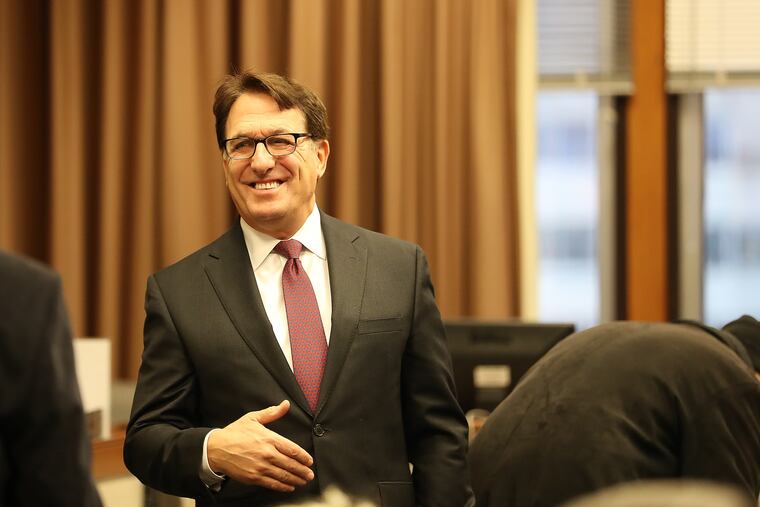Wawa gas station along Delaware River? Philly panel hears case for and against.
The zoning board’s decision, when it comes, could be a decisive moment in Blatstein’s years-long quest to put a Wawa on part of the land that he bought along Columbus Boulevard, between Reed and Tasker Streets.

Dueling visions for central Philadelphia’s eastern waterfront emerged Tuesday as the city’s land-use panel began hearing testimony on developer Bart Blatstein’s proposal for a Wawa with gas pumps on land near the banks of the Delaware River.
Three members of the Zoning Board of Adjustment heard arguments for about two hours before ending the session, so the meeting room could be used for other business. They set a Jan. 21 date for the hearing’s continuation.
Members of Blatstein’s development team argued at the session that the quick-mart filling station is a good fit for the heavily trafficked section of South Columbus Boulevard, which transitioned a generation ago from a blighted industrial zone to a big-box shopping destination.
“I think it’s compatible with the autocentric uses,” said Nancy Templeton of CHPlanning Ltd., who served as land planner on the Wawa proposal. “The autocentric character is probably not going to change.”
That viewpoint was roundly rejected by most people in the packed room, who included residents of the Pennsport neighborhood near the development site, open space and walkability advocates, members of the city’s design community, and elected officials.
When zoning board chair Frank DiCicco asked the roughly 60 spectators for a show of hands opposing the project, nearly all arms shot up. The only people signaling approval were Blatstein and project consultants sitting around him.
Matt Ruben, chair of the Central Delaware Advocacy Group, a coalition of waterfront neighborhood groups, presented a cardboard box to the zoning panel that he said contained more than 950 letters opposing the plan.
“We worked very hard to acquire land and try to provide public amenities to the Pennsport community,” testified Joe Forkin, president of the Delaware River Waterfront Corp. (DRWC), the city-affiliated nonprofit that oversees waterfront development between Port Richmond and South Philadelphia. “The use as proposed right now obliterates all that work that’s been done.”
The zoning board’s decision, when it comes, could be a decisive moment in Blatstein’s yearslong quest to put a Wawa on part of the land that he bought along Columbus Boulevard, between Reed and Tasker Streets, after a previous owner failed to develop a Foxwoods casino at the site.
When he first sought permits for the Wawa project on the southwest quadrant of that parcel, the plan was rejected by the Department of Licenses and Inspections because filling stations may not front on Columbus Boulevard under area land-use rules. Those rules emerged from the Master Plan for the Central Delaware, which was drawn up in the mid-2000s to encourage development that enables pedestrian access to the river.
Rather than appeal L&I’s decision at that time by asking the zoning board for special permission known as a variance, Blatstein suspended his efforts the following spring.
This year, though, L&I accepted a nearly identical plan after Blatstein had a street-facing strip of land declared a separate parcel so that the filling station — legally speaking — faces the strip of land, not the road. A driveway across the buffer, however, would let drivers get to the pumps directly from Columbus Boulevard.
Inspectors accepted the parcel-splitting strategy but instructed Blatstein that the pumps themselves would require a special exception, another type of permission granted by the zoning board with more lenient standards than a variance. Tuesday’s hearing had been scheduled to consider the special exception request.
At the session, lawyers for the city and DRWC argued against the granting of that request, with the latter attorney also asserting that L&I erred by accepting Blatstein’s parcel-separation ploy in the first place.
DiCicco, who sponsored the waterfront master plan legislation years ago while on City Council, appeared sympathetic to the proposal’s opponents.
As part of city lawyer Leonard Reuter’s cross-examination of Templeton, the land planner, he asked her opinion on why the waterfront’s pedestrian-friendly land-use rules had been implemented years ago.
Before she could answer, DiCicco inserted: “The reason that was done is to prevent ... all the big-box gas stations that are south of this site from continuing north.”
Later, DRWC lawyer Michael Mattioni argued that Blatstein’s plan should not qualify for a special exception because it is inconsistent with the plan for the waterfront that was adopted by city lawmakers.
“That’s why it’s important that we talk about the master plan,” Mattioni said.
“I agree,” DiCicco said. “Because if you don’t, any other applicant coming down the pike can make the same argument.”